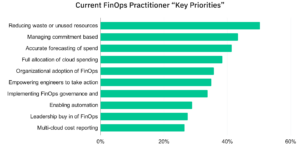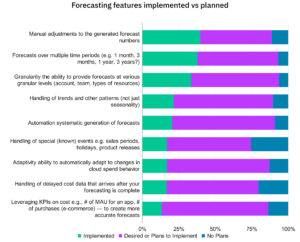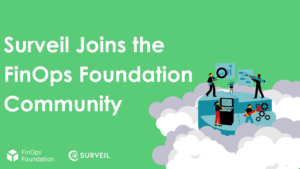The FinOps Foundation’s annual State of FinOps report is packed with a wealth of invaluable insights – and 2024 is no exception. With reducing waste and managing commitments being new key priorities, this year’s report has shown a priority shift from previous years.
Since 2020, the FinOps Foundation’s annual State of FinOps report has been a key resource for cloud organisations. Consulting with industry experts, practitioners, and cloud leaders, the report conveys the most up-to-date snapshot of the current landscape.
Covering a wide range of topics such as cost optimisation strategies and case studies from various industries, the State of FinOps report acts as a fantastic barometer – as well as providing a sturdy foundation on which to build activity over the course of the year. So, what’s 2024 looking like?
Reducing Cloud Waste is Priority One
For the first time since the Foundation’s inaugural report in 2020, the key priority of ‘empowering engineers to take action’ fell from the top spot, moved aside by ‘reducing waste’. This is a clear indication that cloud cost management is finding its way into conversation as businesses attempt to cut costs while maintaining the value of their cloud investments. This trend is also reflected when split by cloud spend – however the second priority shifts from ‘managing commitment based discounts’ to ‘accurate forecasting of spend’ for the lower spenders.
Forecasting Needs Improvements
‘Forecasting’ is defined by ‘the practice of predicting future spending’, involving analysing past spending and projecting future changes in cloud infrastructure and application lifecycles to inform budget planning and investment decisions.
This year’s survey results indicate significant room for improvement for forecasting, with many respondents reporting that several forecasting features remain unimplemented due to factors such as tooling limitations or process complexity. While manual adjustments to forecast numbers are the most commonly implemented feature, results also show a strong desire for handling of trends, automation, and leveraging KPIs on cost.
As such, with the majority of forecasting features not yet being implemented, there is significant room for improvement and goals to strive toward.
Engineering Teams are Getting Their Value From FinOps
FinOps works best when all organisational teams collaborate and work together toward a common goal – after all, collaboration is a key principle in the FinOps methodology for a reason.
This year, the report shows that the Engineering persona is leading the pack in getting the most out of both FinOps training and self-service reporting. Additionally, when asked what teams have increased – or plan to increase – FinOps training uptake, Engineering once again landed in the top percentile. The evidence speaks for itself: the more a team is trained on FinOps and its processes, the more value they’ll extract from the activity.
These examples are only three of the many insights you can take from 2024’s State of Finops report – why not dive into the whole thing here and embrace your FinOps strategy? You’ll gain a deep understanding of current trends and best practices, making you better equipped to navigate the evolving landscape effectively.
To find out more about FinOps and why it’s such an important process to implement, read more in our blog here or head over to the FinOps Foundation website.








